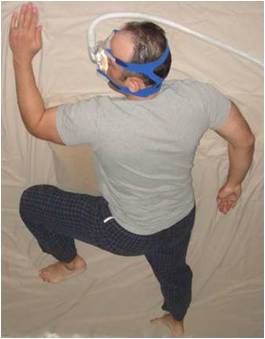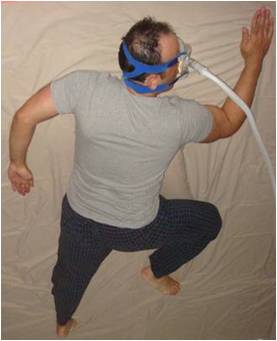bradc,
I'm going to jump in here with my two cents concerning all the discussion about what supplements and/or meds might be appropriate in your case.
I'd urge some caution before jumping in with both feet looking for a magic set of pills to fix the sleep problems. I'm not saying that such things are totally unappropriate. Rather these things are seldom completely benign (including the OTC melatonin, l-tryptophan and 5HtP supplements) and you really want to make sure that what ever you decide to try has a decent chance of actually addressing some of the problems you are trying to fix.
You've written:
Since last October, I have changed my diet, I quit using tobacco, I only have an occasional beer, I have lost about 50 lbs, and I started using my CPAP again. However, I still have exhausting dreams and wake up everyday feeling fatigued. So, while my appearance my be better, I still feel miserable. I have to fight myself to keep my mask on during the night because I always want to sleep on my stomach, but eventually the mask comes off and I'm face first.
and
I wake up every day feeling more tired than the night before, light-headed, and fatigued almost like a hangover. I am constantly in a fog and have problems even coming up with words to finish a sentence. I am a light sleeper and wake up quite a bit during the night. I feel like I can take a nap at any point during the day, including right now while I'm writing this. I have awful dreams; not necessarily emotional dreams like family or friends dying, but physically exhausting dreams
and
I have never thought about "sleep hygiene." I am definitely not following some of those guidelines, namely watching TV and reading in bed.
and
I try not to drink anything within an hour or 2 of going to bed and I rarely drink any alcohol. I already picked up the RX of Prozac, only because I did not know what the rx was for until I had already paid and got home. But, I am not taking them because I have been put on enough anti-depressants to know that they do not help. I forgot to mention earlier that I have been taking 10mg of melatonin for about the last week, but I have never had much luck with it
and
robysue wrote: What other sleepy hygiene guidelines are not yet part of your life?
Watching TV and reading are the big ones. I will watch the clock at times, but that one is not as bad as the other 2. I get regular exercise, I have about as consistent of a routine as possible. I don't drink caffeine much at all. Actually, this was another drastic change as of late. I used to drink 1 to 2 pots of coffee every morning, but I quit drinking anything caffeinated all together.
and
As far as being tired, it is sun-up to sun-down. I am always sleepy tired and a lot of the times my feet feel like lead and my legs feel like jello, but this seems to be tied to how exhausting my dreams are, and how much I wake during the night. And I can most definitely tell a difference in my hunger throughout the day based on this.
It sounds as if there are several potentially separate issues going on with your overall sleep patterns. Among them are:
- Badly fragmented sleep with lots of wakes
- Dreams that leave you physically exhausted
- Difficulty relaxing the mind enough to allow sleep to come naturally without something like the TV or music to distract your thoughts
- Sleep behavior or habits that may be adding to the other issues (i.e. poor sleep hygiene)
- Problems tolerating the mask that may lead to you sleeping without it on your nose for a good bit of the night
- Excessive stress caused by both the lack of high quality sleep and the worrying about how bad your sleep is.
- On going problems with severe daytime sleepiness and fatigue
The thing is: These problems are not likely to be easily resolved by just taking supplements. You need to figure out whether there is a root cause for some of them and treat the root cause. And work on cleaning up the ones that have no real cause by paying more attention to your overall sleep hygiene. (And I mean that in a broad sense and not in a "rules enforcement" sense.)
First, kteague makes a good suggestion when she says that you need to consider the possibility of restless leg syndrome (RLS) and periodic limb movement disorder (PLMD). These are not the same sleep problem, but they both can manifest themselves with a sense of finding sleep
physically exhausting because the body is indeed moving all night long. (It's possible that undiagnosed RLS or PLMD might be triggering some of those dreams where you're running around chasing things all night long.)
Second, I'm wondering if you are also dealing with a sleep phase problem---being forced (or trying) to sleep at a point in the 24 hour cycle that your body simply doesn't want to be asleep at. Or if you are trying to enforce sleeping longer than your body wants to sleep by staying in bed (and dreaming ...) Or if you might have some problems distinguishing wake "day dreaming" from sleep dreaming and your wake mind is inventing some exhausting daydreams that lead to the exhausting sleep dreams. In other words, I'm not sure your main problem is just simple sleep maintenance insomnia. And given that you say, "I feel like I can take a nap at any point during the day," it's also worth asking a doc if there's any chance that you have narcolepsy.
Third, you've got to deal with whatever CPAP comfort issues there are. One of the CPAP comfort issues is sleep position. You say "I have to fight myself to keep my mask on during the night because I always want to sleep on my stomach, but eventually the mask comes off and I'm face first." I know it sounds impossible, but it is possible to stomach sleep with a CPAP mask on your face. (Google "Falcon sleeping position"). So working out a way to sleep on your stomach with the mask on is extremely important. You've also mentioned getting the TAP PAP with the hopes that the fact that it has no headgear may help. That's a start. But you might also want to consider other very minimal masks as well. If you can tolerate nasal pillows, you may find the Bella Loops headgear for the Swift FX nasal pillows more comfortable than the traditional headgear. You may find the AirFit is more comfortable than the mask you are currently wearing. But there's more to CPAP comfort than the mask: Are you using a humidifier? Are you using a heated tube? In either case, if the air coming through the mask is too hot, too cold, too damp, too dry or too stale, then playing around with the humidifier and tube temperature settings is reasonable. Because if the air coming into the mask is any of those things, that's just another negative thing that your brain is likely to focus on when you are trying to get to sleep.
Finally, since you say that you are a "light sleeper" and that you really haven't thought very much about sleep hygiene, I'd suggest starting with sleep hygiene. There's a lot more to sleep hygiene than meets the eye, and it's not just a collection of "rules" to follow. One of the best sources I've ever read for self-help on sleep hygiene is Dr. Barry Krakow's
Sound Sleep, Sound Mind. (And one of Krakow's "rules" is jnk's reminder:
"[The] Trick is to try things without obsessing about them. The point is to lower sources of anxiety rather than making sleep itself an anxiety-inducing concept.") Krakow talks a lot about what you can do to teach yourself how to turn off an over active mind so that you can get some sleep. He also talks a lot about how to minimize the worry (and stress) when you find that you've woken up yet again in the middle of the night. And he takes the time to talk at length about the difference between feeling
tired and exhausted and feeling
sleepy. Finally he spends quite a bit of time talking about what
good sleep is and clearls up a lot of misconceptions about what
good sleep is.
So I would strongly urge you to first work your way through Krakow's suggestions and give "sleep hygiene" in this very broad sense (rather than just a collection of rules to follow) a month or two before turning to taking OTC dietary supplements or insisting to a doc that you need to be put on either a daytime stimulant or night time sedative or both.
If you are NOT making any significant progress getting the sleep to improve through self-help measures loosely described as "sleep hygiene", then it may be time to bite the bullet and start looking at pharmaceutical ideas that might help, including the OTC supplements melatonin, l-tryptophan and 5HtP, as well as prescription meds for sleep and/or prescription meds for increasing daytime alertness (i.e. stimulants). But I'd put that off until you've given the self-help sleep hygiene measures a chance to work.














